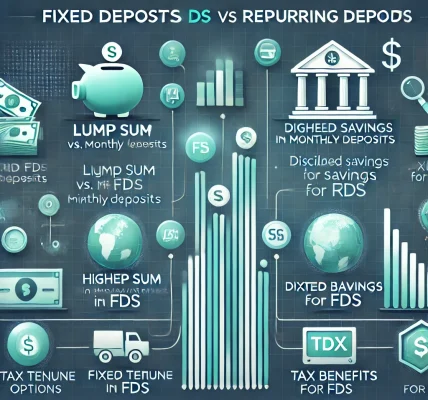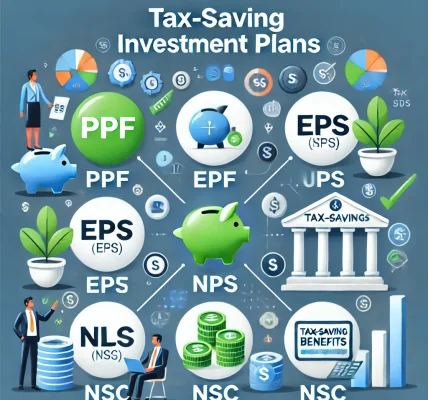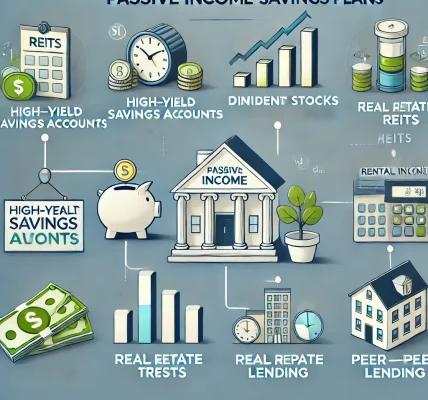Introduction
Saving money is a crucial part of financial planning, and Fixed Deposits (FDs) and Recurring Deposits (RDs) are two of the most popular saving instruments. Both options offer safe and guaranteed returns, but they serve different financial needs. If you’re wondering which one to choose, this comprehensive guide will help you understand their differences, benefits, and which plan suits your financial goals better.
Understanding Fixed Deposits (FDs) and Recurring Deposits (RDs)
Fixed Deposits (FDs):
- A lump sum investment made for a fixed tenure at a predetermined interest rate.
- The interest is compounded and can be withdrawn at maturity or received periodically.
- Suitable for individuals with surplus money seeking stable returns.
Recurring Deposits (RDs):
- A savings scheme where a fixed amount is deposited monthly for a predetermined period.
- Interest is calculated similarly to FDs, but deposits are made regularly instead of a one-time investment.
- Ideal for those who want to develop a disciplined savings habit.
Key Differences Between Fixed Deposits and Recurring Deposits
| Feature | Fixed Deposits (FDs) | Recurring Deposits (RDs) |
|---|---|---|
| Investment Mode | One-time lump sum investment | Monthly installments |
| Interest Rate | Generally higher | Slightly lower than FDs |
| Risk Level | Low risk | Low risk |
| Liquidity | Can be withdrawn before maturity (with penalty) | Premature withdrawal allowed but with restrictions |
| Tenure | 7 days to 10 years | 6 months to 10 years |
| Returns | Higher returns due to compounding over time | Lower than FDs as deposits are made in intervals |
| Tax Benefits | Tax-saving FDs available under Section 80C | No tax-saving options |
Benefits of Fixed Deposits (FDs)
- Higher Interest Rates – Generally offers better interest rates than RDs.
- Flexible Payout Options – You can choose periodic interest payouts or a lump sum at maturity.
- Suitable for Large Investments – Ideal for those with surplus funds looking for safe investment options.
- Tax-Saving Option Available – Certain FDs provide tax benefits under Section 80C.
Benefits of Recurring Deposits (RDs)
- Encourages Habitual Saving – Helps individuals save money regularly.
- No Large Initial Investment Needed – Suitable for salaried individuals who want to save in small amounts.
- Safe and Secure – Guaranteed returns with no market risks.
- Better Returns than Savings Accounts – Offers higher interest rates than standard savings accounts.
Which One Should You Choose?
The choice between FDs and RDs depends on your financial situation and goals:
- Choose FD if:
- You have a lump sum amount to invest.
- You want higher interest earnings.
- You are looking for tax-saving options.
- You prefer flexible payout options (monthly, quarterly, or yearly interest payout).
- Choose RD if:
- You have a stable monthly income and want to save consistently.
- You prefer to invest in small amounts rather than a lump sum.
- You are saving for a short-term goal like a vacation, wedding, or emergency fund.
Tax Implications of FD and RD
- Fixed Deposits: Interest earned is taxable under “Income from Other Sources.” Tax-saving FDs allow deductions up to ₹1.5 lakh under Section 80C, but the interest earned is taxable.
- Recurring Deposits: Interest earned is also taxable as per your income tax slab, and TDS (Tax Deducted at Source) may apply if the total interest exceeds ₹40,000 in a financial year (₹50,000 for senior citizens).
Final Verdict
Both Fixed Deposits and Recurring Deposits serve different financial needs. If you have a lump sum to invest and want higher returns, FDs are the better choice. However, if you prefer saving small amounts regularly while earning decent interest, RDs are ideal. Analyze your financial goals, risk appetite, and liquidity needs before making a decision.
Conclusion
Both FDs and RDs are excellent saving options offering safety and assured returns. The right choice depends on your financial preferences and goals. By making an informed decision, you can maximize your savings and secure your financial future effectively.


